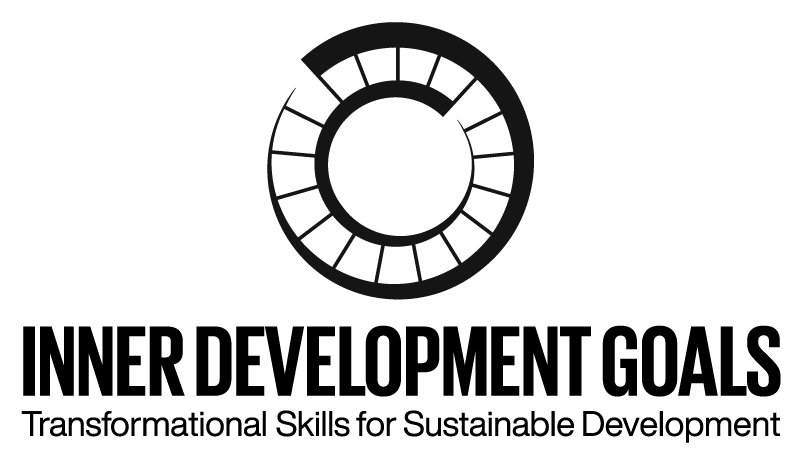Being
Cultivating our inner life and developing and deepening our
relationship to our thoughts, feelings and body help us be present,
intentional and non-reactive when we face complexity.
Inner Compass
Having a deeply felt sense of responsibility and commitment to values
and purposes relating to the good of the whole.
Having an «inner compass» is not a skill, but is rather a consequence
of having a broad scope of awareness that also has led to a motivation
to care for and contribute to the welfare of something much larger
than oneself. This larger whole can be constructed in different ways:
humanity, the global ecosystem, or particular large-scale issues, such
as climate change, environmental problems, public health, human rights,
etc.10 The concept of an inner compass is related to how people make
priorities when making decisions and acting. A stable inner compass
anchored in values relating to a larger whole means that concerns for
the well-being of the larger whole are factored in in various situations.
Quite a few concepts that were listed by survey respondents can be
related to Inner Compass, e.g. being grounded in ethical values,
passion for the whole, caring about others, solidarity and sense of
purpose.
Having an inner compass firmly anchored in a commitment to
contribute to the good of the whole is intimately related to other IDGs,
such as Connectedness, Long-term Orientation and Visioning,
and Perseverance.
Integrity and Authenticity
A commitment and ability to act with sincerity, honesty and integrity.
This item is partly about values one has identified with and is
committed to practicing, but it is also strongly related to personal
maturity. In order to be capable of acting with sincerity, honesty and
integrity, a person has to be keenly aware of his or her inner processes
(reactions, emotions, identifications, see the item Self-awareness
below) as well as having a robust self-sense that is not easily
threatened and thereby giving the person an ability to be appropriately
vulnerable.
Openness and Learning Mindset
Having a basic mindset of curiosity and a willingness to be vulnerable
and embrace change and grow.
A capacity to be open to learning, reevaluation and be curious about
alternative ways of perceiving and interpreting various issues requires
a self that has a considerable measure of robustness. If one’s sense of
self-regard is dependent on identification with a certain self-image or if
one’s sense of safety is linked to a need to defend a certain set of beliefs
and values, there is probably a need for having psychological defense
mechanisms that might inhibit the capacity for remaining open and
curious when encountering unfamiliar or diverging views or events.
Openness and a learning mindset is therefore not to be regarded
solely as a skill that can be trained, but is intimately linked to adult
development processes involving the whole self. Openness is also one
of the personality traits included in the Big Five framework.
In the survey some respondents listed qualities that can be linked with
the capacity for openness, such as tolerance for ambiguity/uncertainty/
discomfort, having a growth mindset and willingness to let go (of
existing patterns).
Openness and Learning Mindset is strongly related to Critical Thinking,
Complexity Awareness, Perspective Skills, Humility, Creativity and
Communication Skills.
Self-awareness
Ability to be in reflective contact with own thoughts, feelings and
desires; having a realistic self-image and ability to regulate oneself.
What goes on inside a person has a considerable impact on that
person’s potential for being effective when engaging with complex
issues, especially in interaction with people with diverse perspectives
and interests. Challenging situations evoke emotional and cognitive
reactions. If a person is not capable of monitoring these reactions,
the capacity for handling them in constructive ways is limited, and the
person may act out emotions, defensive reactions and hasty judgments
without really noticing that this is happening. Self-awareness involves
being aware of emotional, cognitive, motivational and other internal
psychological processes as they happen (or shortly afterwards). Being
in touch with and understanding one’s own inner processes often leads
to greater self-acceptance, less need to cling to an idealized self-image
and therefore less need for psychological defense mechanisms. A well-developed capacity for self-awareness makes it possible to actively manage the relationship between internal (spontaneous) processes
and the expectations and needs coupled to a particular role or function
the person has.
Several formulations relating to the self were mentioned by survey
respondents: self-reflection, self-care, self-acceptance, self-leadership,
and personal integration of mind, body, soul.
Self-awareness is closely linked to Presence, Humility, Integrity and
Authenticity, Openness and Learning Mindset.
Presence
Ability to be in the here and now, without judgement and in a state of
open-ended presence.
This capacity is strongly linked to Openness and Learning Mindset, but
emphasizes the quality of making oneself fully available in encounters
with other people, in an accepting, mindful, sensitive and nonjudgmental way. This quality can partly be regarded as a skill that can be trained by practicing mindfulness exercises. But arguably a welldeveloped capacity for presence is also dependent on being relatively free from preoccupation with projecting and defending a particular selfimage or a psychological need for upholding the stability of a certain worldview that provides a sense of safety.
Resources
IDG Full Reportdate
November 21, 2022

